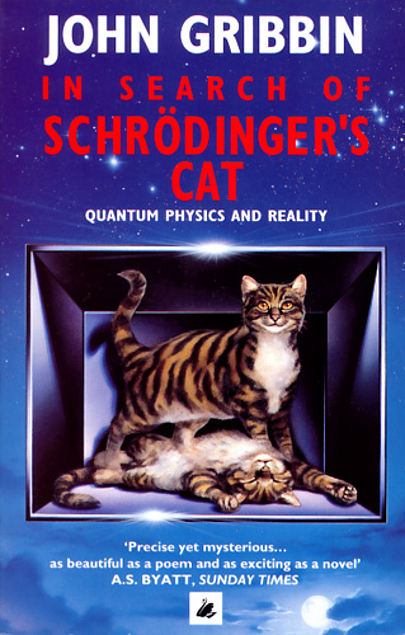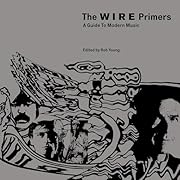Aug. 31st, 2020
John Gribbin "In Search Of Schrodinger's Cat" (Black Swan)

This is the story of quantum physics told in an easy to access language, aimed specifically at the non-scientific reader. However, I would say you need to know a little about physics and the theories of the universe to get the most out of this book.
Despite knowing quite a lot about physics and chemistry I still found some parts of this book hard to follow, you really need to have an interest in the subject matter to compel you to read to the end otherwise you could get bogged down in science and put the book aside for a later date.
I enjoyed this reading this book but since it was originally written in 1983 science has moved on in leaps and bounds, especially with the research into the Higgs Boson at CERN so it would need updating and to appeal to a wider audience. Still worth reading though.

This is the story of quantum physics told in an easy to access language, aimed specifically at the non-scientific reader. However, I would say you need to know a little about physics and the theories of the universe to get the most out of this book.
Despite knowing quite a lot about physics and chemistry I still found some parts of this book hard to follow, you really need to have an interest in the subject matter to compel you to read to the end otherwise you could get bogged down in science and put the book aside for a later date.
I enjoyed this reading this book but since it was originally written in 1983 science has moved on in leaps and bounds, especially with the research into the Higgs Boson at CERN so it would need updating and to appeal to a wider audience. Still worth reading though.
Word Of The Day
Aug. 31st, 2020 10:01 amToday's interesting word is -
Stochastic
Stochastic refers to a randomly determined process. The word first appeared in English to describe a mathematical object called a stochastic process, but now in mathematics the terms stochastic process and random process are considered interchangeable. The word, with its current definition meaning random, came from German, but it originally came from Greek στόχος (stókhos), meaning 'aim, guess'.
The term stochastic is used in many different fields, particularly where stochastic or random processes are used to represent systems or phenomena that seem to change in a random way. The term is used in the physical sciences such as biology, chemistry, ecology, neuroscience, and physics as well as technology and engineering fields such as image processing, signal processing, information theory, computer science, (including the field of artificial intelligence), cryptography[15] and telecommunications. It is also used in finance, due to seemingly random changes in financial markets as well as in medicine, linguistics, music, media, colour theory, botany, manufacturing, and geomorphology.
Stochastic social science theory is similar to systems theory. In music we can reference stochastic music composer, John Cage and his use of the I Ching in creating his aleatoric music. John Cage has a section to himself in the book The Wire Primers.

John Cage / David Tudor - Indeterminacy 1
Indeterminacy 1 · John Cage and David Tudor
Indeterminacy: New Aspect of Form in Instrumental and Electronic Music
℗ 1992 Smithsonian Folkways Recording
Stochastic
Stochastic refers to a randomly determined process. The word first appeared in English to describe a mathematical object called a stochastic process, but now in mathematics the terms stochastic process and random process are considered interchangeable. The word, with its current definition meaning random, came from German, but it originally came from Greek στόχος (stókhos), meaning 'aim, guess'.
The term stochastic is used in many different fields, particularly where stochastic or random processes are used to represent systems or phenomena that seem to change in a random way. The term is used in the physical sciences such as biology, chemistry, ecology, neuroscience, and physics as well as technology and engineering fields such as image processing, signal processing, information theory, computer science, (including the field of artificial intelligence), cryptography[15] and telecommunications. It is also used in finance, due to seemingly random changes in financial markets as well as in medicine, linguistics, music, media, colour theory, botany, manufacturing, and geomorphology.
Stochastic social science theory is similar to systems theory. In music we can reference stochastic music composer, John Cage and his use of the I Ching in creating his aleatoric music. John Cage has a section to himself in the book The Wire Primers.

John Cage / David Tudor - Indeterminacy 1
Indeterminacy 1 · John Cage and David Tudor
Indeterminacy: New Aspect of Form in Instrumental and Electronic Music
℗ 1992 Smithsonian Folkways Recording
Bank Holiday Monday
Aug. 31st, 2020 08:45 pmAfter the last few days it was a lovely surprise to have a really warm sunny day overall. I walked into town to have the very last day half price food offer - thanks to or government. It has proved very popular and has helped restaurants and pubs get customers back. Such establishments would like it to continue for another month at least.
I had the large breakfast during the morning and then returned early afternoon for a sweet.

That sweet was cookie dough with ice cream.

I also met Ewart at the Railway Inn for a few beers which turned out to be three or more. I staggered home, arriving at around five and soon was asleep. I awoke a few minutes ago and sorted out some clothes for washing.
Whilst in town I did take a pic of the shop cat at Hatton Hall records and instruments.

He is such a friendly cat as well.
So now it is time to listen to some Oliver Messiaen.
I had the large breakfast during the morning and then returned early afternoon for a sweet.

That sweet was cookie dough with ice cream.

I also met Ewart at the Railway Inn for a few beers which turned out to be three or more. I staggered home, arriving at around five and soon was asleep. I awoke a few minutes ago and sorted out some clothes for washing.
Whilst in town I did take a pic of the shop cat at Hatton Hall records and instruments.

He is such a friendly cat as well.
So now it is time to listen to some Oliver Messiaen.
